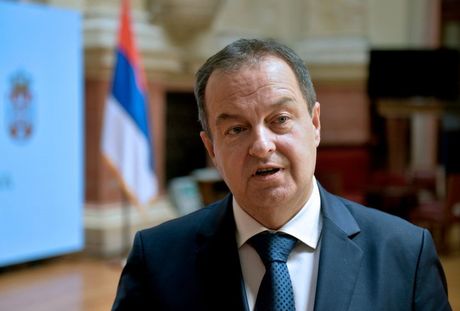Dacic: UN General Assembly debate on resolution is attempt to avoid Russia's veto

First Deputy Prime Minister and Minister of Foreign Affairs of Serbia Ivica Dacic has said that proposing a resolution on Srebrenica before the United Nations General Assembly is an attempt to avoid Russia's veto, but also that there is the question of legality because the topics that are discussed by the UN Security Council cannot be debated before the UN General Assembly.
Dacic told TV Prva that a meeting presented the so-called zero draft resolution and that all UN missions could attend the meeting.
"It is interesting that many missions have asked the question of why this is being discussed now and how the issue has suddenly arisen. When it comes to things like this, the UN generally tries to adopt (resolutions) by consensus. After all, there was only one case when a decision was made about that and that was about Rwanda. But that was before the adoption of the general resolution, the universal resolution on genocide, and when December 9 was introduced. After that, it never happened that any individual example was the subject of a resolution in the General Assembly," said Dacic.
He stressed that in addition to the lack of consensus in the UN and in BiH (Bosnia and Herzegovina) itself, there is no consensus on this issue.
"A large number of delegations referred to the fact that there is no consensus in Bosnia and Herzegovina itself, that the presidency did not make a decision and that it was an independent action by the Muslims and Croats and the head of the mission," said Dacic.
He added that there is also the question of legality, because according to the UN Charter, topics discussed by the UN Security Council (UNSC) cannot be discussed before the General Assembly without the permission of the UNSC.
"The Security Council did not give permission, on the contrary, they refused it because Russia vetoed it. This is an attempt to avoid the veto, going to the UN General Assembly. Add to that that the resolution is proposed under the item of the agenda that refers to the culture of peace, memory, and which requires a simple majority, not a two-thirds majority," Dacic said.
Dacic explained that decisions in the UN General Assembly on important issues are always made by a two-thirds majority.
(Telegraf.rs/Tanjug)
Video: Putnici gradskog saobraćaja ovo nisu videli! Ludilo u autobusu 73
Telegraf.rs zadržava sva prava nad sadržajem. Za preuzimanje sadržaja pogledajte uputstva na stranici Uslovi korišćenja.

